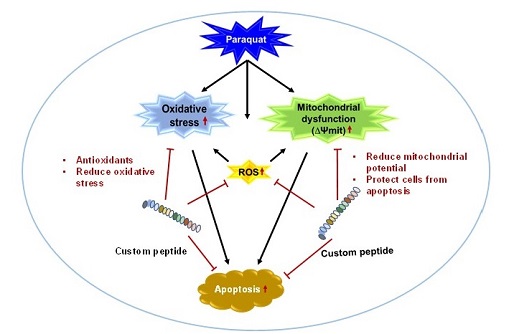
The proposed neuroprotection mechanism of custom peptides against PT-induced neurotoxicity in PC-12 cells
Researchers from the Institute of Advanced Study in Science and Technology (IASST), Guwahati, and Tezpur University have developed drug-like peptides, inspired by snake venom neurotrophin molecules that could reduce the progression of neurodegenerative diseases at a significantly lower concentration.
Neurodegenerative disease (ND) is a major global health problem. Parkinson's disease is the second most common neurodegenerative disorder after Alzheimer's. No specific medications or effective therapeutics exist to stop, slow, or prevent these diseases.
“This study is about snake venom nerve growth factors that inspired the development of novel, safe, and effective drugs to prevent the progression of neurodegenerative diseases such as Parkinson's disease”, researchers inform India Science Wire.
An effective treatment for Parkinson's disease is the administration of levodopa (a dopamine precursor). However, prolonged use of dopamine agonists (a chemical substance that binds to and activates specific receptors on cells, causes a biological response that tends to reduce their therapeutic efficacy and lead to several adverse effects.
Researchers from the Institute of Advanced Study in Science and Technology (IASST), Guwahati, and Tezpur University have developed drug-like peptides, inspired by snake venom neurotrophin molecules that could reduce the progression of neurodegenerative diseases at a significantly lower concentration.

“Snake venom is a treasure trove of drug prototypes for various biomedical applications such as cancer, cardiovascular disease, and COVID-19. It can effectively treat neurodegenerative disorders, including Parkinson's disease. Studies from our lab have identified, purified, and characterized nerve growth factor (NGF) from Indian Cobra and Russell's viper venom and shown that they possess neuritogenesis (the sprouting of neurites from a cell) properties,” the research team informs.
However, drug development from a native snake venom toxin is tedious due to the venom crisis, stringent regulatory requirements, and costs. To overcome the challenge, the researchers have evolved two novel synthetic custom peptides (TNP and HNP) inspired by snake venom neurotrophin molecules. Their low molecular weight, structural stability, small size, and target sensitivity make them powerful tools for conquering the limitations of using endogenous NGF as therapeutic agents.
The drug-like peptides at a low dose (nanomolar concentration) can potentially reduce the progression of the paraquat-induced toxicity and symptoms associated with the Parkinson's disease. They have been found to be showing several anti-Parkinson activities by reducing mitochondrial dysfunction, cellular death, etc.
“The drug-like peptides could reduce the progression of neurodegenerative diseases at a significantly lower concentration. This treatment would be most effective for people with fewer symptoms at the early onset of the disease. However, in-depth investigations through in vivo, pharmacokinetic, and pharmacodynamic studies for the successful development of safe drug prototypes for neurodegenerative disorders would be needed,” the researchers recommend
It is worth noting that Vigyan Prasar has been working on ‘Science Communication, and its Popularization, and Extension (SCoPE)’ for over three decades. Nimish Kapoor, Senior Scientist in Vigyan Prasar, presented the vote of thanks.
India Science Wire
ISW/SM/IASST/Parkinson’s/Eng/22/03/2023





